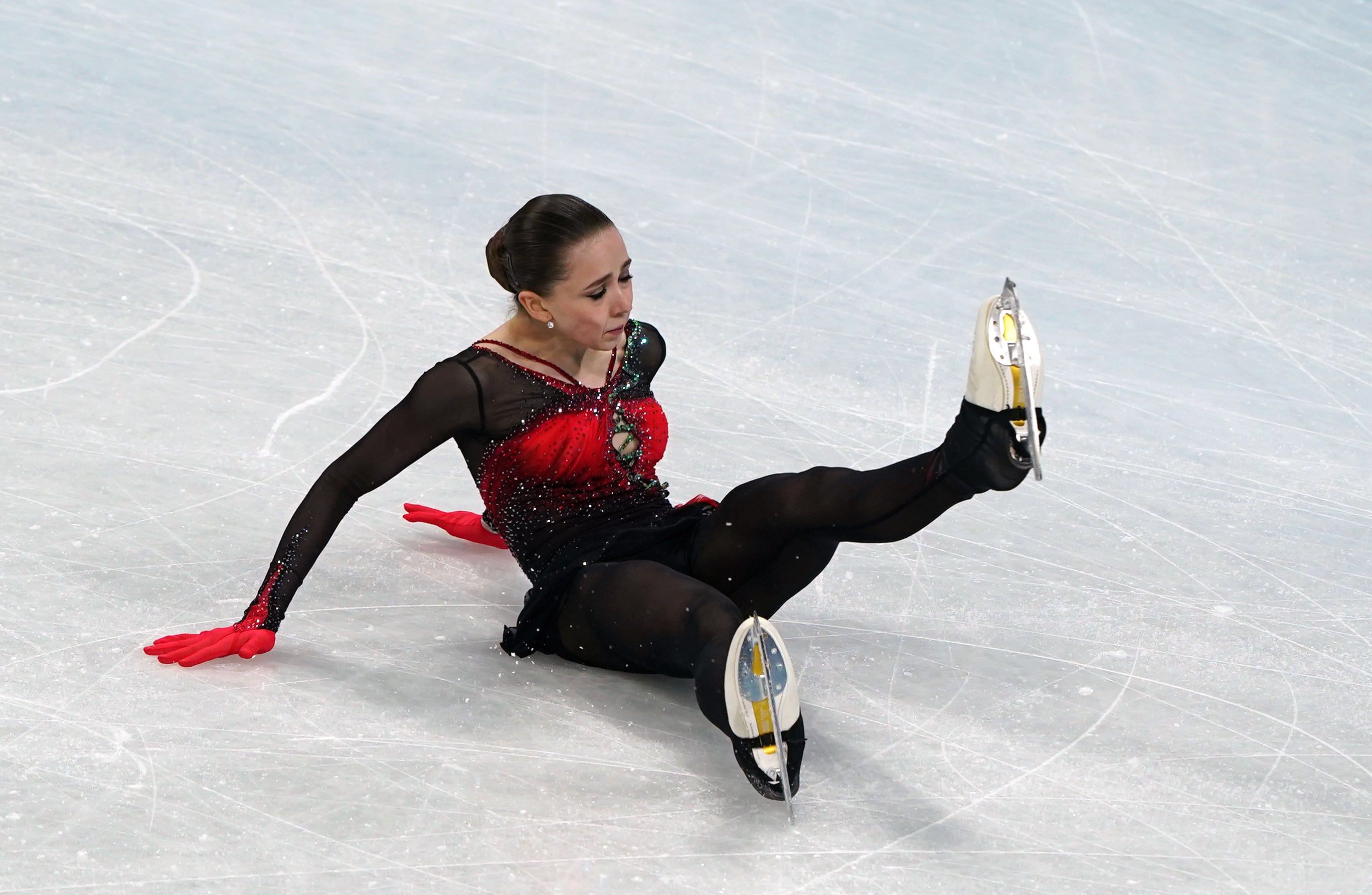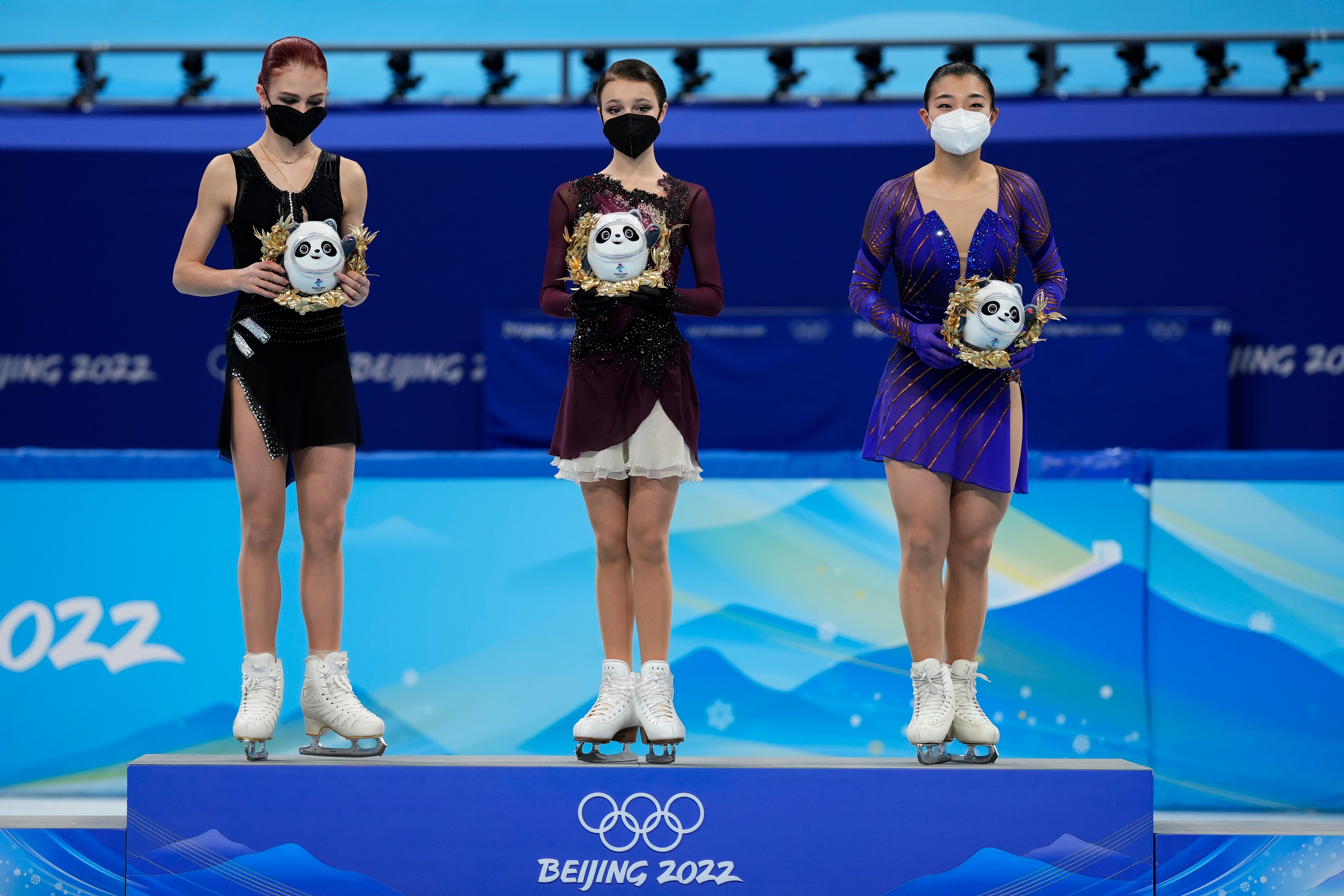More losers than winners as Kamila Valieva’s Winter Olympics ends in tears
Anna Shcherbakova took gold after 15-year-old Valieva finally wilted under the pressure of being the story of the Games

Your support helps us to tell the story
From reproductive rights to climate change to Big Tech, The Independent is on the ground when the story is developing. Whether it's investigating the financials of Elon Musk's pro-Trump PAC or producing our latest documentary, 'The A Word', which shines a light on the American women fighting for reproductive rights, we know how important it is to parse out the facts from the messaging.
At such a critical moment in US history, we need reporters on the ground. Your donation allows us to keep sending journalists to speak to both sides of the story.
The Independent is trusted by Americans across the entire political spectrum. And unlike many other quality news outlets, we choose not to lock Americans out of our reporting and analysis with paywalls. We believe quality journalism should be available to everyone, paid for by those who can afford it.
Your support makes all the difference.In the end there was a winner but there were a lot more losers, from a bewildered child to a sport in crisis to the Olympics itself.
It’s a tired trope to say figure skating is founded on tears and tantrums, after all, competitors learn their fate in a place officially called the “Kiss and Cry Zone”.
Sure it was dramatic but not in a way that soared your spirits, more in a way that crushed your soul.
Anna Shcherbakova proved that scripts are always there to be torn up and that even the most surreal of stories can have the most improbable of twists.
The world champion took Olympic women’s figure skating gold with a remarkable and nerveless performance, as her training partner Kamila Valieva, the 15-year old skater at the heart of these Games’ biggest story, simply wilted, surely understandably, under the most intense pressure to finish fourth.
Valieva produced two brilliant skates to help Russia claim a now disputed first place in the team title last week, including becoming the first woman to land a quadruple jump at the Olympics.
The stories were already being written, she was the face of the Games, perhaps even the girl to save the most troubled Olympics in recent history.
But then came the news she’d failed a doping test last December, igniting an unseemly legal battle, with a child as a bewildered pawn under the full glare of a salivating media spotlight.
Her Olympic bubble finally burst, reality now bites, with pressing who and why questions over how a child was doped in pursuit of sporting success still unanswered.
Allowed to skate – though not cleared of a doping offence – Valieva was leading narrowly heading into the decisive free skate.
But “Miss Perfect” – whose performances this season means she was being hailed as the greatest of all-time – was anything but when it mattered.

As she finished her stuttering routine to Ravel’s Bolero, in which she’d set a world record score in November, the tears came. It was a tough watch, a little girl lost in the swirling maelstrom, just desperately wanting to go home and be left alone.
When she stepped off the ice, broken, she didn’t get consolation but an inquisition: “Why did you let it go,” demanded Russian team coach Eteri Tutberidze, a joyless figure whose win at all costs drive comes at a price not worth paying.
There were cheers too, Shcherbakova’s free skate was a joy, but the abiding memory of this evening will be teenagers in bits on live TV, mascara streaming down their cheeks in the most unedifying of spectacles.
“It’s hard to say what I’m feeling right now,” said Shcherbakova, 17. “There are mixed feelings, firstly, pleasure because I was in the right time and place and did the right things. I still don’t comprehend what has happened, I’m overwhelmed by happiness but I also feel an emptiness inside.
“After my performance I realised I’d done the maximum I could, I’d achieved my goal and this was the important thing. This is the pinnacle for me.”
Valieva’s tears were for an innocence lost and silver medallist Alexandra Trusova’s were for what she perceived as the injustice of judges, as Japan’s Kaori Sakamoto took bronze.
Trusova, also just 17, landed an improbable five quad jumps, they’d never been one at the Games before last week, and was raging. She flew into a back stage fury as she saw her second place announced.
“Everyone has a gold medal, but I don’t,” she yelled at stone-faced Tutberidze, the Svengali figure whose role in this tawdry spectacle now requires thorough investigation.
“I will never go on the ice again in my life. I hate this sport, I hate it and you knew everything.”
Trusova sat expressionless in a later press conference, a tumult of simmering angst clearly raging inside her. She tempered her words but her body language said it all.
“These words were just emotions, I’ll think it over and take a decision about the future,” she said.

“For the past three years I did not win anything, not a single important competition. I was trying to achieve lofty goals with my quadruple jumps. I thought when I did this I would win but I did not.
“I did what I could and I’m not happy and that’s why I was angry and disappointed. I did something never done before, I’ve been waiting for this moment a long time but I still didn’t win the gold.”
Valieva meanwhile left without saying a word – having skated for perhaps the last time ever.
The International Olympic Committee (IOC) had said there’d have been no medal ceremony if she’d made the podium and an asterisk would be applied to results. If they were breathing a sigh of relief about what unfolded they’d be advised to do it very, very quietly.
“I saw what a burden this was for Kamila, I understand how she feels as an athlete,” added Shcherbakova. “I will not talk about this situation because I want to talk to her personally.”
Trusova added little else, saying: “I’m not going to say anything about Kamila, you need to ask questions to her.”
There are certainly questions to be answered – but not just for Valieva. There are questions for her coaches, her support team and her sport and, perhaps, for all those who chronicled the story that will define these Olympics.
Watch All the Olympic Winter Games Beijing 2022 live on discovery+, Eurosport and Eurosport app
Join our commenting forum
Join thought-provoking conversations, follow other Independent readers and see their replies
Comments